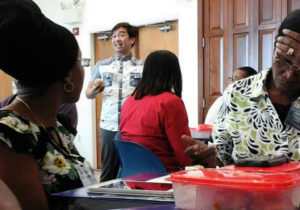
A French love letter in a bottle. A dead blue whale. A pile of trash lying below a reminder to pick up the trash. Santa Claus, stripped of all his clothes. A vial of blood. An electric guitar, still connected to an amplifier. An unexploded bomb.
These are some of the things participants attending a workshop on marine debris said they found on beaches from the Virgin Islands to the Gulf of Mexico.
There was also a doll’s head with vacant eyes. That was the find of Dr. Kristen Wilson Grimes, an assistant professor of watershed ecology at the University of the Virgin Islands.
For the introductory exercise at her Marine Debris Educator’s Workshop, Grimes asked each participant to stand, hold the plastic doll’s head and tell the story of their weirdest find on the beach.
Most did. Some didn’t want to touch it – too creepy. But the stories captured the attention of those in the room at the Administration and Conference Center.
The purpose of the day-long workshop was to give teachers from public, private and parochial schools the tools and vocabulary needed for classroom instruction. It also served as an introduction to a grant program that illustrates the ways ocean-borne debris harms the environment.
According to the National Oceanographic and Atmospheric Administration, beach debris consists of solid material, cast off manufactured or processed material that was improperly disposed of into a marine environment.
As the stories unfolded it became clear that debris finds it way to the beach in different ways.
Research professor Senai Habtes said his find in the Gulf of Mexico appeared deliberate.
“I have seen every type of appliance and electronics you can think of,” he said.
The find of VI-EPSCoR director Kim Waddell marked the end of life for one of nature’s largest creatures. The dead blue whale on the California coast, near San Francisco, did not fit the definition of marine debris. But Waddell said it was, for him, a first.
“It was an honor to see so magnificent a creature, even in death,” he said.
For Planning and Natural Resources Outreach coordinator Katy Edwards, the debris – a naked Santa Claus doll – came back to its owner at a beach clean up.
The volunteer, a live-aboard, lost her boat during hurricane season. It turned out the doll was the only remnant of her former life. When she picked it up, the volunteer hugged the doll and cried.
“It turns out it was hers. It was on her sailboat and when her boat crashed in the storm, it was all she found,” Edwards said.
VI-EPSCoR stands for the Virgin Islands Experimental Program to Stimulate Competitive Research. One of the goals of the 13-year-old program is to find practical applications for the research being carried out.
Through the NOAA funded grant entitled “Pride in Our Seas, Pride in Ourselves,” the workshop seeks to engage the community’s help in spotting and cleaning up debris. Almost 2,000 students have received instruction and taken part in activities as a result of those researched based collaborations.
It also provides further information to teachers already working with UVI graduate students and research assistants on community projects. Projects include beach cleanups where students and teachers will identify and catalog items they find.
Educators are also encouraged to help develop classroom curriculum showing how marine debris impacts the environment.





